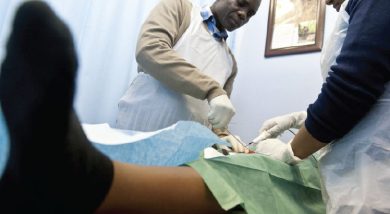Youths fight abortion law
When the police in Nkhotakota detained a 19-year-old girl for abortion in March, some young women in Balaka farmed out an appeal on Twitter for a lawyer to defend her.
“We want the restrictive law changed because the youth are bearing the brunt. Abortion still happen, but rural girls are dying or getting detained while their urban peers safely abort in private clinics,” says Titani Magalasi, from the Foundation for Civic Education and Social Empowerment (Focese).
The organisation founded by young women in 2014 is opposed to Malawi’s colonial law that permits abortion only to save a woman’s life.
The youthful activists are busy on the social media and on the ground, engaging lawmakers to urgently discuss new exceptions proposed by the Malawi Law Commission in 2015.

They find it ironic that 57 years after independence, women and girls in Malawi keep dying “under the yoke left by our colonial masters”.
“What’s funny is that even in the UK, they no longer use the law we still invoke to oppress women and girls,” Magalasi says.
A nationwide study by reproductive health experts at the College of Medicine tracked almost 141 000 clandestine abortions in 2015—and 60 percent sought treatment for various complications.
The Ministry of Health reports that abortions conducted by unskilled hands outside clinical settings cause between six and 18 percent of all pregnancy-related deaths in the country.
“These deaths could be averted if laws allowed health facilities to safely terminate pregnancies on more grounds than just one,” says Magalasi.
Every Monday and Wednesday 8 to 11am, Focese opens its doors to out-of-school girls to learn computer skills, tailoring and soap-making. They also discuss sexual and reproductive health experiences to reduce unintended pregnancies, unsafe abortion and child marriages.
Its pro-choice campaign targets spaces where the youth meet.
“We noted that the contribution of the youth, who are active on social media, wasn’t strong, so we wanted to dial up their voice as Parliament is expected to debate the Termination of Pregnancy Bill,” explains Magalasi.
Offline, the campaigners are senstising lawmakers to the untold misery girls and young women suffer due to unsafe abortion. They photograph legislators who endorse the cause and share the photos online.
The youth movement is increasing allies against unsafe abortion—the third-highest killer of pregnant women.
“Some youth groups have met MPs in different districts to support the Bill. However, some MPs say they want evidence before taking sides,” says Magalasi.
The activist finds it ironic because nearly all abortions go undetected unless they trigger complications likely to cause deaths, injuries and disabilities.
“So far, we have met 35 legislators and only 33 said yes to the Bill. One said no because of religious issues and another was ‘not just for the Bill’. Surprisingly, both were women.”
In March, Focese joined youthful marchers who stormed Parliament, asking why female lawmakers were silent on the Bill to liberalise abortion in line with the Maputo Protocol the government ratified.
Lonnie Chijere, chairperson of the Women Caucus of Parliament, says the 42-member bloc was willing to support the Bill.
“I understand the anger, but we cannot pass judgement on women now when the motion was not presented in Parliament,” she says.
Matthews Ngwale, the chairperson of Parliament’s Committee on Health, has volunteered to table the Bill.
He finds it strange that women appear reluctant.
“There must be an explanation which I am yet to find out, but something is wrong, women seem hesitant about this thing,” Ngwale explains.
He calls for more awareness as most lawmakers may not have understood the Bill religious leaders discredit as a sinful alien agenda.
Magalasi says it is puzzling that the lawmakers do not time to read proposed laws.
“There is need for special strategies targeting them, especially women, as previous campaigns often came to life when the Bill was expected to go to Parliament,” she suggests.
Magalasi urges women MPs to spring up and put a human face to the Bill championed by Ngwale.
She states: “They don’t need studies to prove abortion kills. They grew up in a society where it occurs and everyone knows someone who suffered the deadly complications. Some girls cannot marry or give birth because their wombs were removed. No one should go into the bush to die from a procedure that could be safely procured in hospital.”
The 28-year-old campaigner was in Form Two when her 14-year-old friend died from a backstreet abortion.
“She was raped and didn’t tell anyone. We only learnt that she was pregnant when she was found dead in a pool of blood. It was chilling,” she recalls.
Magalasi says she encounters similar stories in hospitala dn communities where she works.
“Two months ago, I met a girl bleeding and weeping in the corridors of Zomba Central Hospital. I thought she had come to give birth, but her mother said she had attempted to terminate a pregnancy using sticks,” she states.
Magalaso urges the lawmakers looking for evidence to visit their nearest hospitals’ post-abortion care sections, where health workers extract blood clots, wires, sticks and toxic substances from survivors’ birth canals.
“Lawmakers shouldn’t be debating whether abortion is right or wrong, but how they can save the lives it claims,” she states.





